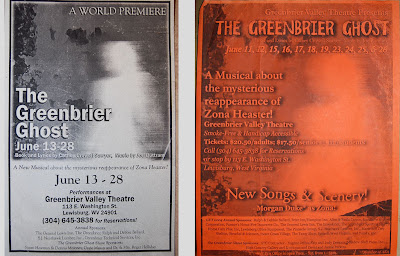It's the moment dreaded by all theater actors. You're in the middle of a big scene and your brain decides to substitute the wonderful prose of a talented writer for something far less favorable like the sounds made by a dying Tweety bird.
For some less-acclaimed thespians, it's the moment your brain involuntarily orders your face to appear as a deer in the headlights. Seconds turn into minutes during this uncomfortable time warp that makes other actors sound like Sylvester Stallone in slow-motion.
Such was the case for me during last night's brush-up rehearsal for the Ghost. But the dozen or so eggs that I'm still wiping off my face can be solely attributed to my personal lack of focus Tuesday night. I was goofing off after being away from the theater for a week and learned that I'm not good enough to goof off after being away from the theater for a week.
But, lest I digress.
So, how do actors learn all those lines anyway? As the character Rucker, I only have a few pages of lines to memorize, but the stars of the show like Lori Gardner, Kurtis Donnelly and Pamela Paul have dozens of pages to master.
With no formal training under my belt, I'm unaware of any special techniques or secrets to learning lines. Perhaps they are taught in the New York acting schools by someone who puffs on a long-stemmed cigarette and barks through a cardboard megaphone.
For my first lengthy role about eight years ago, the director threw the script in my lap and politely said: "Memorize this and try not to goof off so much, Giggenbach." To which I replied: "Who's your Daddy?"
After glancing through that voluminous script, I assumed my acting career would be short lived because of the memorization involved. I've been diagnosed with Attention Deficit Disorder and sometimes my attention span is less than
"I knew there was a catch to this acting stuff," I thought to myself as I caught a re-run of Sanford and Son while scratching off a few lottery tickets and finishing up a phone call.
However, our brains must be hard-wired to memorize lines because this is how it works for me. After repeating the lines hundreds of times, something in my brain clicks and the words are on auto-pilot, ready to fly at the touch of a button.
However, my auto-pilot crash landed last night. During the courtroom scene, I thought it would be quite amusing to say my first few lines via the style of the Peter Falk TV character Lt. Columbo. I screwed up immediately.
Realizing the Columbo bit was a bad idea, I shelved that for saying the lines with a different tempo and used my regular voice instead of the heavy southern accent I created for my character.
For the next five minutes, I cruised through the scene as the veteran actor Pamela Paul perfectly matched my tempo, but I quickly lost my place and had to ask for a line, uh, about 3 or 4 times.
You can't "break character" in front of a live audience. If you lose your place, all you can do is pray that the time warp will end quickly and another actor will bail you out by throwing you a line that puts your brain back on auto-pilot.
So my lollygagging cost everyone a chance to rehearse a complicated scene which involves split-timing lines among actors stretched across the width of the stage.
That won't happen at tonight's performance, so if your looking forward to hurling rotten vegetables at me during the curtain call, just keep them in your garden.
I plan on respectfully asking the actors in the scene to do a run through before going on stage.

 I began the odd hobby of performing live theater primarily for the same, inherent reason I became a writer. The self-indulgence of my heightened ego.
I began the odd hobby of performing live theater primarily for the same, inherent reason I became a writer. The self-indulgence of my heightened ego.